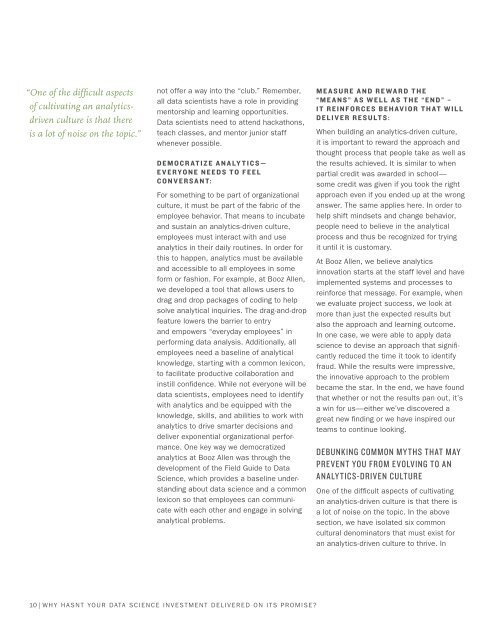Tips for Building a Data Science Capability
WH4vS
WH4vS
Create successful ePaper yourself
Turn your PDF publications into a flip-book with our unique Google optimized e-Paper software.
“One of the difficult aspects<br />
of cultivating an analyticsdriven<br />
culture is that there<br />
is a lot of noise on the topic.”<br />
not offer a way into the “club.” Remember,<br />
all data scientists have a role in providing<br />
mentorship and learning opportunities.<br />
<strong>Data</strong> scientists need to attend hackathons,<br />
teach classes, and mentor junior staff<br />
whenever possible.<br />
DEMOCRATIZE ANALYTICS—<br />
EVERYONE NEEDS TO FEEL<br />
CONVERSANT:<br />
For something to be part of organizational<br />
culture, it must be part of the fabric of the<br />
employee behavior. That means to incubate<br />
and sustain an analytics-driven culture,<br />
employees must interact with and use<br />
analytics in their daily routines. In order <strong>for</strong><br />
this to happen, analytics must be available<br />
and accessible to all employees in some<br />
<strong>for</strong>m or fashion. For example, at Booz Allen,<br />
we developed a tool that allows users to<br />
drag and drop packages of coding to help<br />
solve analytical inquiries. The drag-and-drop<br />
feature lowers the barrier to entry<br />
and empowers “everyday employees” in<br />
per<strong>for</strong>ming data analysis. Additionally, all<br />
employees need a baseline of analytical<br />
knowledge, starting with a common lexicon,<br />
to facilitate productive collaboration and<br />
instill confidence. While not everyone will be<br />
data scientists, employees need to identify<br />
with analytics and be equipped with the<br />
knowledge, skills, and abilities to work with<br />
analytics to drive smarter decisions and<br />
deliver exponential organizational per<strong>for</strong>mance.<br />
One key way we democratized<br />
analytics at Booz Allen was through the<br />
development of the Field Guide to <strong>Data</strong><br />
<strong>Science</strong>, which provides a baseline understanding<br />
about data science and a common<br />
lexicon so that employees can communicate<br />
with each other and engage in solving<br />
analytical problems.<br />
MEASURE AND REWARD THE<br />
“MEANS” AS WELL AS THE “END” –<br />
IT REINFORCES BEHAVIOR THAT WILL<br />
DELIVER RESULTS:<br />
When building an analytics-driven culture,<br />
it is important to reward the approach and<br />
thought process that people take as well as<br />
the results achieved. It is similar to when<br />
partial credit was awarded in school—<br />
some credit was given if you took the right<br />
approach even if you ended up at the wrong<br />
answer. The same applies here. In order to<br />
help shift mindsets and change behavior,<br />
people need to believe in the analytical<br />
process and thus be recognized <strong>for</strong> trying<br />
it until it is customary.<br />
At Booz Allen, we believe analytics<br />
innovation starts at the staff level and have<br />
implemented systems and processes to<br />
rein<strong>for</strong>ce that message. For example, when<br />
we evaluate project success, we look at<br />
more than just the expected results but<br />
also the approach and learning outcome.<br />
In one case, we were able to apply data<br />
science to devise an approach that significantly<br />
reduced the time it took to identify<br />
fraud. While the results were impressive,<br />
the innovative approach to the problem<br />
became the star. In the end, we have found<br />
that whether or not the results pan out, it’s<br />
a win <strong>for</strong> us—either we’ve discovered a<br />
great new finding or we have inspired our<br />
teams to continue looking.<br />
DEBUNKING COMMON MYTHS THAT MAY<br />
PREVENT YOU FROM EVOLVING TO AN<br />
ANALYTICS-DRIVEN CULTURE<br />
One of the difficult aspects of cultivating<br />
an analytics-driven culture is that there is<br />
a lot of noise on the topic. In the above<br />
section, we have isolated six common<br />
cultural denominators that must exist <strong>for</strong><br />
an analytics-driven culture to thrive. In<br />
10 | WHY HASNT YOUR DATA SCIENCE INVESTMENT DELIVERED ON ITS PROMISE?


